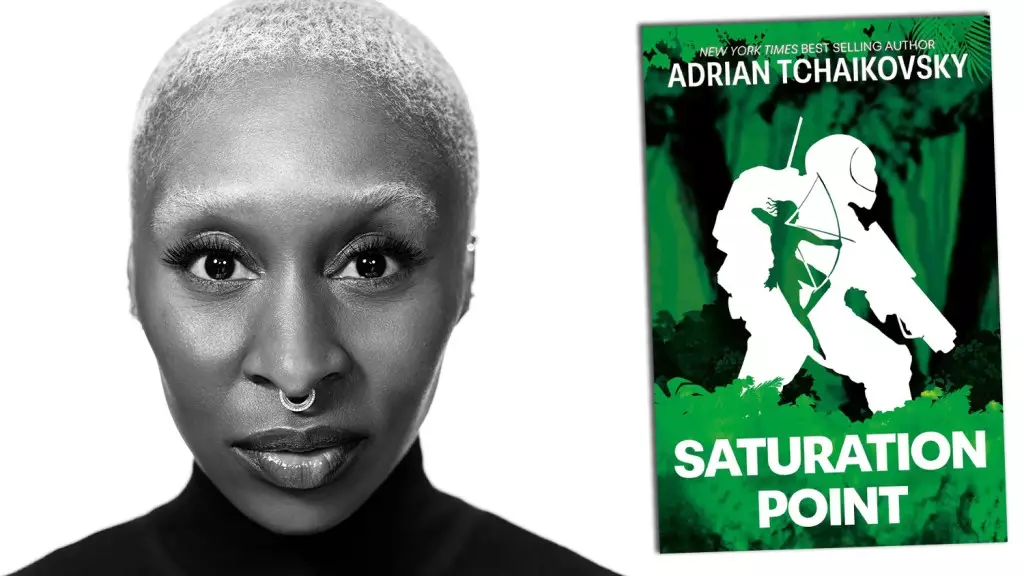Cynthia Erivo’s transition from celebrated actress to shrewd producer signals a commendable shift in how Hollywood approaches genre filmmaking. With her production company Edith’s Daughter spearheading the adaptation of Adrian Tchaikovsky’s *Saturation Point*, Erivo is not merely chasing commercial success but is intentionally carving space for narratives that have been historically marginalized. This is much more than a typical sci-fi thriller setup; it’s an opportunity to inject fresh perspectives into a genre too often characterized by conventional optimism or dystopian monotony. The very premise – a perilous equatorial rainforest zone where intelligent life is not confined to humans – tempts audiences into confronting both environmental and existential questions through a lens rarely tinted by diverse cultural insights.
Erivo’s company doesn’t just produce but commits to normalizing stories spotlighting overlooked groups, giving this project a vital political and social edge amidst Hollywood’s slow reckoning with inclusivity. This production choice is both timely and urgent, underscoring a broader cultural necessity rather than serving as mere tokenism. It poses an implicit challenge to the industry: to embrace complex narratives that honor marginalized voices without reducing them to clichés.
Risky Terrain: Exploring ‘The Zone’ and Human Exceptionalism
The storyline’s setting—in a hostile rainforest dubbed ‘The Zone’—is not just a backdrop but an allegory challenging humanity’s presumed dominance. Dr. Jasmine Marks’ expedition into this hostile wilderness symbolizes a deeper philosophical interrogation of intelligence and survival beyond the human species. In an era dominated by climate anxiety and concerns over ecological collapse, *Saturation Point* might act as an eerie, necessary mirror held up to modern fears. That the zone proves “far deadlier” than expected, inhabited by non-human intelligences, shakes the anthropocentric foundations that underlie both genre fiction and broader cultural narratives.
However, while the concept is tantalizing, execution remains critical. The thriller must avoid pitfalls of becoming mere spectacle, relying instead on nuanced storytelling that embraces ethical and existential complexity. This is where working with a team like Platinum Dunes, renowned for Michael Bay’s blockbuster thrillers, could be double-edged: their track record for visual flair doesn’t always guarantee depth. Balancing kinetic action with thoughtful reflection will be crucial to prevent the adaptation from falling into generic genre traps.
Hollywood Dynamics: Collaboration and Commercial Stakes
The collaboration between Erivo’s Edith’s Daughter and Platinum Dunes under Universal Pictures’ banner signals a rare union of socially conscious storytelling ambition and Hollywood blockbuster muscle. With producers like Michael Bay involved, the project will likely command a significant budget and industry attention. This convergence of artistry and commerce embodies modern filmmaking’s tensions: How to marry profitability with political substance?
It is encouraging that Universal Pictures is backing a project rooted in diversity and contemporary relevance, especially under the stewardship of executives like Ryan Jones and Christine Sun, who appear committed to nurturing underrepresented voices. The involvement of writer Minnie Schedeen, who will adapt Tchaikovsky’s dense narrative, also implies a willingness to translate complex science fiction into accessible yet thought-provoking cinema.
The Stakes of Representation Beyond the Spotlight
Erivo’s journey, from her lauded performance in *Wicked* to her advocacy behind the camera, epitomizes the evolving role of actors of color in the entertainment industry. Yet this evolution extends beyond representation merely in front of the camera: it challenges how stories are told, whose experiences are validated, and which genres are deemed worthy of inclusion.
In a landscape where sci-fi remains predominantly white and male-centric, *Saturation Point* represents a bold, necessary disruption. It ventures into the wilderness both literally and figuratively, grappling with what it means to be intelligent, human, and worthy of storytelling attention in a time demanding transformative justice across all cultural spheres. Cynthia Erivo’s embrace of this project moves beyond symbolic inclusion — it stakes a claim for genre diversity that cinema desperately needs but too often neglects.


Leave a Reply